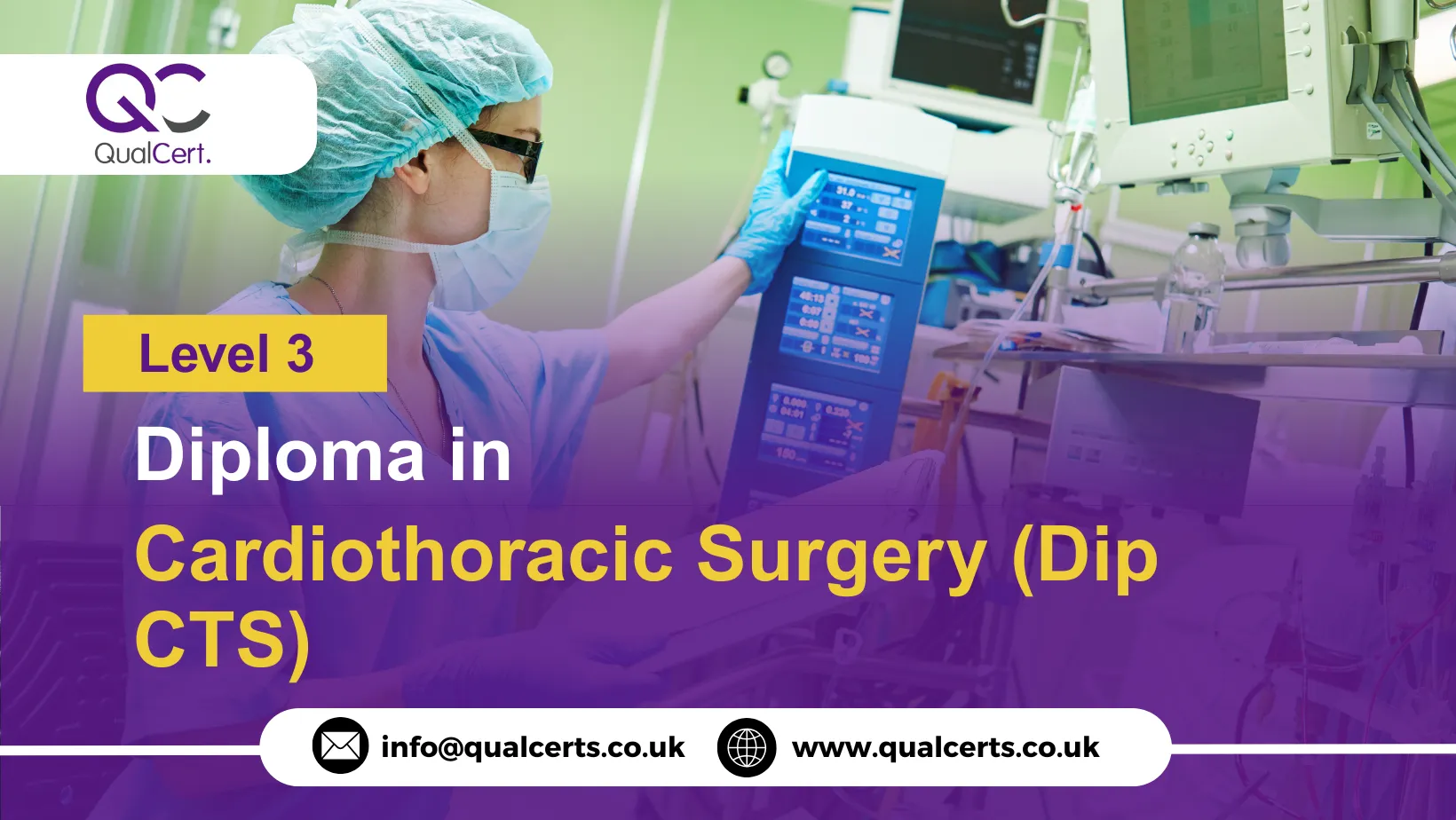The QualCert Level 3 Diploma in Cardiothoracic Surgery (Dip CTS) is a specialised qualification designed for healthcare professionals and surgical practitioners seeking advanced knowledge and skills in the field of cardiothoracic surgery. Recognised in the UK and internationally, this diploma equips learners with the expertise to support surgical teams, manage perioperative care, and contribute effectively to patient outcomes in cardiothoracic settings.
The Dip CTS provides comprehensive training in the principles of cardiothoracic surgery, covering cardiac and thoracic anatomy, surgical techniques, perioperative management, patient assessment, and post-operative care. Participants will gain both theoretical knowledge and practical skills required to assist in surgical procedures, manage patients before and after surgery, and collaborate effectively within multidisciplinary surgical teams.
The course emphasises patient safety, ethical practice, and evidence-based surgical interventions, ensuring learners are prepared to work in hospitals, surgical units, and specialised cardiothoracic departments in line with UK professional standards.
The QualCert Level 3 Diploma in Cardiothoracic Surgery equips healthcare professionals with the essential skills and knowledge to deliver high-quality, evidence-based care in cardiothoracic surgical settings. Through a combination of theoretical learning and practical application, this diploma enables learners to make a meaningful impact on patient outcomes and surgical excellence.
Course Contents of QualCert Level 3 Diploma in Cardiothoracic Surgery (Dip CTS):
The QualCert Level 3 Diploma in Cardiothoracic Surgery (Dip CTS), offers 60 Credits, requiring a Total Qualification Time (TQT) of 300 hours, including 210 Guided Learning Hours (GLH).
| Unit Ref# | Unit Title | Credit | GLH | TQT |
| QC27151-1 | Principles of Cardiothoracic Surgery | 10 | 35 | 50 |
| QC27151-2 | Preoperative Assessment and Patient Preparation | 10 | 35 | 50 |
| QC27151-3 | Surgical Techniques and Perioperative Care | 10 | 35 | 50 |
| QC27151-4 | Postoperative Care and Complication Management | 10 | 35 | 50 |
| QC27151-5 | Pharmacology and Therapeutic Interventions | 10 | 35 | 50 |
| QC27151-6 | Research, Evidence-Based Practice, and Professional Skills | 10 | 35 | 50 |
Entry Requirements for the QualCert Level 3 Diploma in Cardiothoracic Surgery (Dip CTS):
To enrol on the QualCert Level 3 Diploma in Cardiothoracic Surgery (Dip CTS), learners must meet the following entry requirements:
Minimum Age
- Applicants must be at least 18 years old at the time of enrolment
Educational Background
- A relevant healthcare, medical, or surgical qualification is required
- Equivalent qualifications demonstrating foundational knowledge in anatomy, physiology, or health sciences may also be considered
Experience
- Practical experience in healthcare, clinical, or surgical settings is preferred but not mandatory
- Applicants without formal experience should demonstrate strong motivation and interest in cardiothoracic surgery
Language Proficiency
- Proficiency in English is required for academic study and professional communication
- Applicants may need to provide evidence of English language competence, such as IELTS or equivalent, if English is not their first language
Learning Outcomes for the QualCert Level 3 Diploma in Cardiothoracic Surgery (Dip CTS):
Principles of Cardiothoracic Surgery
- Understand cardiac and thoracic anatomy, physiology, and pathology relevant to surgical practice
- Identify common cardiothoracic conditions and surgical indications
- Analyse the impact of diseases on cardiothoracic function
- Apply foundational knowledge to clinical and surgical assessment
Preoperative Assessment and Patient Preparation
- Conduct comprehensive preoperative assessments for cardiothoracic patients
- Evaluate patient history, risk factors, and diagnostic results
- Prepare patients for surgery, including education and consent
- Develop preoperative care plans based on best practice guidelines
Surgical Techniques and Perioperative Care
- Assist in cardiothoracic surgical procedures safely and effectively
- Apply sterile techniques and operating room protocols
- Manage perioperative patient care to ensure safety and optimal outcomes
- Collaborate with surgical teams to support efficient clinical workflow
Postoperative Care and Complication Management
- Monitor patients following cardiothoracic surgery for recovery progress
- Recognise potential postoperative complications and implement interventions
- Provide patient support for pain management and rehabilitation
- Adjust care plans based on patient response and evidence-based guidelines
Pharmacology and Therapeutic Interventions
- Understand pharmacological management in cardiothoracic surgery, including analgesia and anticoagulation
- Apply therapeutic interventions safely and appropriately
- Integrate pharmacological and non-pharmacological strategies to enhance patient recovery
- Monitor medication effectiveness and patient response
Research, Evidence-Based Practice, and Professional Skills
- Apply evidence-based practice in clinical decision-making
- Conduct research using validated methodologies relevant to cardiothoracic surgery
- Demonstrate professional, ethical, and patient-centred behaviour
- Develop communication, leadership, and teamwork skills in multidisciplinary surgical teams
The Course is idael for ;
- Nurses, surgical assistants, and healthcare practitioners specialising in cardiothoracic surgery
- Surgical trainees and clinical staff aiming to enhance knowledge in cardiothoracic care
- Individuals seeking to work in hospitals, surgical units, or specialised cardiothoracic departments
- Professionals interested in improving patient outcomes through evidence-based surgical practice
- Anyone pursuing advanced skills in surgical assessment, perioperative care, and postoperative management
The Centre Requirements for QualCert Level 3 Diploma in Cardiothoracic Surgery (Dip CTS):
- Centres must be accredited by QualCert or an equivalent recognised awarding organisation
- Must have qualified teaching staff with relevant surgical and healthcare expertise
- Adequate classroom, simulation, and practical facilities for theoretical and hands-on learning
- Access to clinical and surgical resources for practical training and assessment
- Policies and procedures for learner support, assessment, and quality assurance in line with UK professional standards

